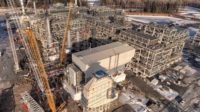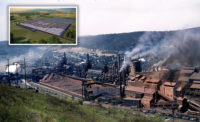
Going to places where few others might tread—be it the Sydney Tar Ponds in Nova Scotia or battle zones in Iraq and Afghanistan—may not have been a cakewalk for Burlingame, Calif.-based contractor ECC, but the tough gigs have paid off sweetly.
Since its founding in 1985, the company has quietly grown from a small cleanup firm with $100,000 in sales to a multi-sectored global construction giant serving the federal government—and a changing mix of other owners—with design and construction revenue now at $770 million. "We've kept a fairly low profile," says Manjiv S. Vohra, president and CEO. "People that need to know about us already do."
Indeed, ECC has become a go-to firm for its loyal federal clients. Called to Iraq for its expertise in handling unexploded ordnance (UXO), the firm soon became the largest U.S. Air Force Center of Environmental Excellence contractor there, with work extending into other construction arenas, says Vohra.
"ECC has done some outstanding work for the Air Force in Iraq and Afghanistan," says Col. Curt A. Van De Walle, chief of the strategic design and construction division for the U.S. Air Force Civil Engineer Center, based at Lackland Air Force Base in Texas, who notes the firm's "forward-leaning mission focus and corporate philosophy."
ECC ranks at No. 79 on ENR's list of the Top 400 Contractors, noting $735.4 million in 2012 construction revenue, more than $504 million of that in non-U.S. work.
Even as it has grown to 531 employees in the U.S. and abroad, ECC pushes to maintain the same kind of entrepreneurial culture from which the firm sprang.
"Complex, Remote, Hostile and Austere"
Founder and Chairman Paul Sabharwal launched the firm into the emerging environmental field, seeing opportunity for a small firm to do specialized work, such as chemical waste disposal, that larger competitors avoided, says Vohra, a chemical engineer trained in India who joined in 1988 and rose to assume the top jobs in 2000.
"I was fascinated by the environmental sector," he says, noting that the firm seeks out the "complex, remote, hostile and austere" in the work it takes on.
Glenn Sweatt, a 22-year veteran and now vice president of contracts and compliance, says, "Employees have a lot of latitude in developing their programs and markets. They are permitted to fail in trying new things."
ECC soon gained status as an 8A federal contractor and made its mark in emergency response and doing what was then the largest UXO cleanup. Work also included remediation of contamination at Colorado's Summitville Mine, from which up to 85,000 gallons of toxic liquid had leaked into local waterways. "That catapulted us into the big leagues," says Vohra.
The firm benefitted from military cleanups and other work related to U.S. base realignment in the past decade. With a stronger set of capabilities, ECC could compete with larger firms in project and program management.
ECC was one of four firms selected by the Army Corps of Engineers—out of 22, says Vohra—for post-Katrina debris cleanup in 2005, an assignment that lasted two and a half years.
The company mobilized again last year after Superstorm Sandy, stationing senior managers in the New York City area for three months when it was called to join the debris-removal task force. Col. Paul E. Owen, the Corps' New York district commander, notes the firm's contribution in removing nearly 300,000 tons of construction and other debris and recycling more than 80% of it. The team effort was cited in September with a U.N. Green Star award.
Centers of Excellence
ECC also won kudos in June from the Canadian government for completion, in joint venture with J&T Van Zutphen Construction Inc. of the $75-million stabilization and solidification of tar ponds at a defunct Nova Scotia coking plant. The Sydney Tar Ponds cleanup, which has cost a total of more than $393 million since the 1980s, was the largest remediation project in Canadian history, says Randy Vallis, an official of Public Works and Government Services Canada.
ECC's efforts for public-sector owners have taken it to more than 20 countries, with work that includes, since the 1990s, building construction, says Vohra. "We got into construction management in Iraq," he says. There, ECC built or rehabbed hundreds of buildings, training local labor and subcontractors.









Post a comment to this article
Report Abusive Comment